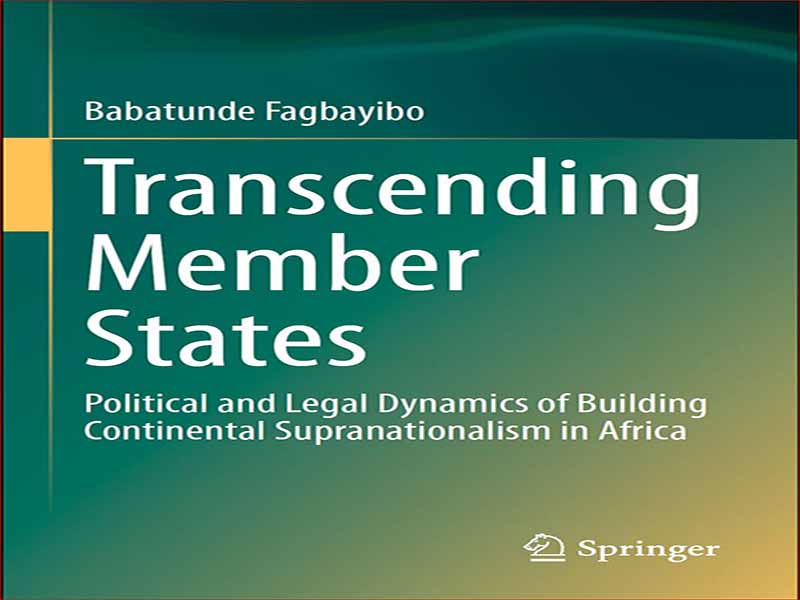- عنوان کتاب: Transcending Member States / Political and Legal Dynamics of Building Continental Supranationalism in Africa
- نویسنده: Babatunde Fagbayibo
- حوزه: آفریقا
- سال انتشار: 2022
- تعداد صفحه: 177
- زبان اصلی: انگلیسی
- نوع فایل: pdf
- حجم فایل: 2.64 مگابایت
آفریقا در حال حاضر یکی از مهم ترین مراحل توسعه یکپارچه خود را تجربه می کند. از سال 2015، فعالیتهای فزایندهای در زمینه توسعه سیاستها و شیوهها پیرامون تقویت اتحادیه آفریقا (AU) با قدرتهای قاطعتر برای هماهنگی و وضع قوانین الزامآور در رابطه با روند ادغام منطقهای صورت گرفته است. به عبارت دیگر، هدف این فرآیندها پوشاندن قدرت های فراملی به اتحادیه اروپا است، مانند قدرت هایی که توسط اتحادیه اروپا (EU) اعمال می شود، که با وجود مشکلات داخلی، موفق ترین آزمایش فراملی گرایی در جهان باقی مانده است. این شامل تلاش هایی مانند تصمیم برای تامین مالی اتحادیه AU از طریق مالیات 0.2٪ بر واردات واجد شرایط به کشورهای عضو، تصمیم برای کاهش تعداد پورتفولیوی کمیسیون اتحادیه AU از 8 به 6، تصویب و لازم الاجرا شدن (در 30 ام) است. در ماه مه 2019) از موافقتنامه بسیار تبلیغ شده ایجاد منطقه تجارت آزاد قاره آفریقا (AfCFTA)، تصویب پروتکل معاهده تأسیس جامعه اقتصادی آفریقا در رابطه با جابجایی آزاد افراد، حق اقامت و حق استقرار، و اتخاذ چارچوب خط مشی دستور کار 2063 AU در سال 2015. اینکه چگونه این فرآیندها جهت ادغام منطقه ای در آفریقا را تغییر خواهند داد، به وجود مؤسسات با کیفیت و دارای وقف بستگی دارد. این تحولات به دلایل نمادین و عملی متعددی نتیجه دارد. اولاً، این است که آنها ترجمه چندین دهه عبارات در مورد نیاز به منطقه گرایی قوی تر را نشان می دهند. این بدان معنا نیست که موقعیت های مهم دیگری در تاریخ منطقه گرایی وجود نداشته است، جز پذیرش اسناد در مورد منطقه تجارت آزاد قاره ای (و سرعت پذیرش و در نهایت تصویب آن توسط کشورهای عضو) و جابجایی آزاد افراد. سطحی از کشش که قبلاً به ندرت شاهد آن بوده ایم. ثانیاً، این واقعیت که حرکت به سمت منطقهگرایی تقویتشده در آفریقا در میان پویاییهای متلاطم جهانی (برگزیت، ظهور احزاب و عناصر سیاسی فاشیست در اروپا و ایالات متحده، و مناقشه تجاری ایالات متحده و چین) صورت میگیرد، نوعی انعطاف را نشان میدهد، که اگر مدیریت صحیح می تواند سودمند باشد. ثالثاً، این تحولات پیامدهای جدی برای موقعیت جهانی آفریقا دارد، به ویژه در زمینه افزایش سریع علاقه (یا آنچه برخی آن را تقلای جدید برای آفریقا مینامند) قدرتهای سنتی و نوظهور در مزیت ژئواستراتژیک آفریقا. در نهایت، این تحولات مستقیماً از امکان اعطای اختیارات الزام آور و قاطعانه به اتحادیه اروپا برای وادار کردن کشورهای عضو به عمل بر اساس هنجارهای سازمانی صحبت می کند. اهمیت اتحادیه اروپا در ماتریس دستیابی به فراملی گرایی قاره ای موثر در آفریقا را نمی توان اغراق کرد. اتحادیه اروپا بزرگترین سازمان منطقه ای در جهان است که از تمام 55 کشور این قاره تشکیل شده است. علیرغم کاستیهای فراوان، از طریق ارگانها و اسناد هنجاری خود، نماد نهادینهسازی چشمانداز یک قاره یکپارچه شده است. همانطور که ادوزی بیان می کند، اتحادیه آفریقا به وسیله ای تبدیل شده است که از طریق آن آفریقایی ها تاثیر خود را بر جهانی شدن نشان می دهند، زیرا آنها شبکه اجتماعی فرافرهنگی از ارزش ها، هویت ها و فرهنگ های آفریقایی را ایجاد می کنند که در نماد پان آفریقا برای آفریقایی ها و نوادگان آفریقایی تجسم می یابد. . به طور مشابه، Tieku هفت حوزه را برجسته کرد که اهمیت و موفقیت اتحادیه AU را تا کنون مشخص کرده است. اینها عبارتند از: تقویت نمایندگی آفریقا در صحنه جهانی. اجتماعی شدن مستمر طبقه سیاسی آفریقا برای پذیرش ارزش ها و هنجارهای لیبرال به عنوان پایه ای برای همکاری بین دولتی. تغییر نگرش بسیاری از دولت ها در آفریقا از فرهنگ بی تفاوتی به فرهنگ جدید توجه به صلح و امنیت آفریقا به طور کلی. ایجاد نهادهای تصمیم گیری بین المللی کم هزینه، چابک و مبتکر در طیف وسیعی از موضوعات/ حوزه ها؛ موفقیت در وضع قوانین بین المللی که قوانین و سیاست های ملی را شکل داده است. توسعه استانداردهای هنجاری گسترده و مؤثر در دوره نسبتاً کوتاهی از وجود خود؛ و این واقعیت که در زمینههایی که دولتهای آفریقایی را تشویق میکنند تا رفتار مناسبی داشته باشند، تهاجمات چشمگیری داشته است. همچنین Wiebusch و همکاران. اشاره کرد که تصویب بیش از 40 معاهده توسط اتحادیه اروپا در کمتر از دو دهه از وجود خود (2000-2018) “منعکس کننده نهادینه سازی بیشتر مکانیسم حاکمیت قاره ای از طریق قانون است. همچنین نشان دهنده سطحی از اطمینان در سیستم AU به توانایی قانون برای مهندسی تغییرات اجتماعی است.
Africa is currently experiencing one of the most consequential phases of its integrative development. Since 2015, there have been increasing activities around the development of policies and practices around enhancing the African Union (AU) with more assertive powers to coordinate and make binding rules regarding the regional integration process. In other words, these processes aim to cloth the AU with supranational powers, like those exercised by the European Union (EU), which, despite its internal problems, remains the most successful experimentation of supranationalism in the world. This has included efforts such as the decision to finance the AU through an 0.2% tax levy on eligible imports into member states, the decision to reduce the number of AU Commission portfolios from eight to six, the adoption and entry into force (on the 30th of May 2019) of the much touted Agreement establishing the African Continental Free Trade Area (AfCFTA), the adoption of the Protocol to the Treaty Establishing the African Economic Community Relating to Free Movement of Persons, Right to Residence and Right of Establishment, and the adoption of the AU Agenda 2063 policy framework in 2015. How these processes will change the direction of regional integration in Africa is dependent on the existence of quality endowed and driven institutions. These developments are consequential for several symbolic and practical reasons. Firstly, is that they represent the translation of decades of expressions on the need for stronger regionalism. This is not to say that there have not been other momentous occasions in the history of regionalism but the adoptions of instruments on continental free trade area (and the speed in which it was adopted and eventually ratified by member states) and free movement of persons exhibit some level of traction that has rarely been witnessed before now. Secondly, the fact that moves towards enhanced regionalism in Africa is happening amidst turbulent global dynamics (Brexit, the rise of fascist political parties and elements in Europe and the U.S., and the U.S.—China trade dispute) posit some form of resilience, which if properly managed could prove beneficial. Thirdly, these developments have serious implications for Africa’s global positioning, particularly in the context of the rapidly increasing interest (or what some call the new scramble for Africa) of traditional and emerging powers in Africa’s geo-strategic advantage. Lastly, these developments speak directly to the possibility of endowing the AU with the much-needed binding and assertive powers to compel member states to act according to organisational norms. The importance of the AU in the matrix of achieving effective continental supranationalism in Africa cannot be overstated. The AU is the largest regional organisation in the world, composed of all the 55 countries on the continent. Despite its many shortcomings, it has come to symbolise the institutionalisation of the vision of an integrated continent through its organs and normative documents. As Edozie puts it, the AU has become a vehicle through which Africans are marking their own impact on globalization as they forge a trans-cultural social network of African values, identities and cultures embodies in the symbol of pan-Africa for Africans and African descendants. Similarly, Tieku highlighted seven areas that have defined the importance and success of the AU thus far. These are: the enhancement of African agency on the world stage; the steady socialisation of the African political class to accept liberal values and norms as the basis for interstate cooperation; the changed attitudes of many governments in Africa from a culture of indifference to a new culture of caring about the African peace and security as a whole; the creation of low-cost, agile, and innovative international decision-making bodies in wide range of issues/areas; success in making international laws that have shaped national legislation and policies; developing wide ranging and effective normative standards in a relatively short period of its existence; and the fact that it has made significant inroads in the areas of nudging African governments to behave appropriately. Also, Wiebusch et al. noted that AU’s adoption of more than 40 treaties in less than two decades of its existence (2000–2018) “reflects a greater institutionalization of continental governance mechanism through law. It also suggests a level of confidence within the AU system in the ability of law to engineer social change”.
این کتاب را میتوانید از لینک زیر بصورت رایگان دانلود کنید:
Download: Transcending Member States





































نظرات کاربران